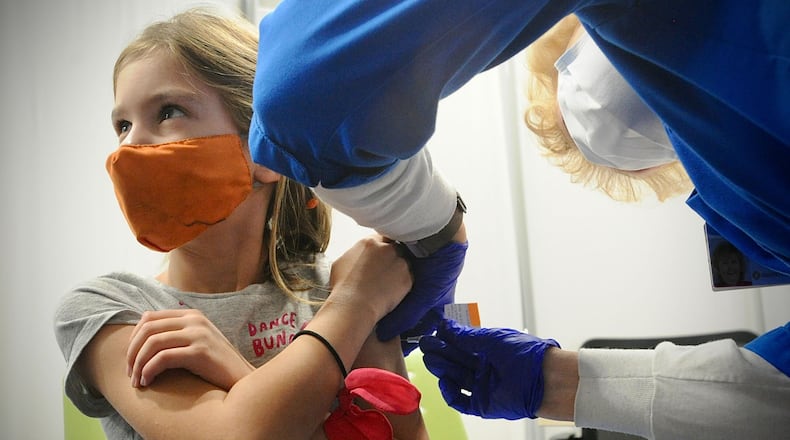Here are seven things to know about the shots designed for children younger than 5.
1) Do they work?
The shots offer young children protection from hospitalization, death and possible long-term complications that are still not clearly understood, the CDC’s advisory panel said.
In studies, vaccinated youngsters developed levels of virus-fighting antibodies as strong as young adults, suggesting that the kid-size doses protect against coronavirus infections.
However, exactly how well they work is hard to pin down, especially when it comes to the Pfizer vaccine.
Two doses of Moderna appeared to be only about 40% effective at preventing milder infections at a time when the omicron variant was causing most COVID-19 illnesses. Pfizer presented study information suggesting the company saw 80% with its three shots. But the Pfizer data was so limited — and based on such a small number of cases — that experts and federal officials say they don’t feel there is a reliable estimate yet.
2) Can kids get seriously sick from COVID?
While adults are more likely to get seriously sick from COVID-19, children have been impacted by the virus as well, Dr. Adam Mezoff, chief medical officer of Dayton Children’s Hospital said.
“It’s fair to say that adults tend to get a lot sicker than children, but it would be wrong to think children can’t get seriously ill. In fact, we’ve had countless number of kids admitted to our ICU over the course of the pandemic, and there have been children within the region who have died of COVID,” Mezoff said.
The CDC is also recommending that young children get vaccinated.
3) Where can kids get them?
U.S. officials expect most shots to take place at pediatricians’ offices. Dayton Children’s Hospital said they are beginning to give the shots today. Those interested in learning more about the shots can go to the hospital’s website to learn more.
Officials say it is unclear what the demand for the shots will be.
Greene County Public Health will offer the vaccine starting at its Friday clinic. The clinic is at 360 Wilson Drive in Xenia. Appointments can be scheduled at gettheshot.coronavirus.ohio.gov and walk-ins are accepted.
4) What type of shots are there?
For small children ages 6 months to 5 years, there’s a two-shot series from Moderna Inc. administered one month apart. For kids 4 years and younger, there’s also a three-shot series from Pfizer Inc. and German partner BioNTech SE: The first two doses are given three weeks apart, and the third dose eight weeks after the second dose, according to the FDA.
Dayton Children’s will be using the Pfizer shots.
5) Are there side effects?
Common side effects of Moderna’s shot can include pain, injection-site swelling and fever, the agency said. For Pfizer’s, the most common side effects included irritability, decreased appetite and fever.
6) What if a child was already sick?
About three-quarters of children of all ages are estimated to have been infected at some point. For older ages, the CDC has recommended vaccination anyway to lower the chances of reinfection.
Experts have noted re-infections among previously infected people and say the highest levels of protection occur in those who were both vaccinated and previously infected.
7) When should a kid get them?
Dr. Mezoff said the new vaccines are being added to a child’s routine vaccination plan and parents should consider immunizing their child now as cases may go up in the fall.
“Since both of the series take a few months to get the protection to its maximum level, that’s one of the reasons to consider doing things like this now,” Mezoff said. “And again, if you have kids less than 5 or 6 who are going in for routine vaccinations anyway, it would be good to add this to their vaccination schedule as opposed to having to do this separately.”
The Associated Press contributed to this report
About the Author

